- Home
- Barbara Pym
A Few Green Leaves Page 3
A Few Green Leaves Read online
Page 3
‘Good morning, Mrs Dyer,’ he greeted her, in what he hoped was a pleasant, encouraging tone of voice. ‘I’ve just been reading here about how people had to be buried in woollen in the old days.’
‘I don’t know about that,’ she declared. ‘I never heard of it.’
‘Well, no, it was in the seventeenth century, the late seventeenth century,’ Tom emended, ‘Anthony à Wood has it here.’
She glanced suspiciously at the volume on Tom’s desk.
‘If you’re ready, Mrs Dyer,’ Daphne said, ‘I’ll help you move these things.’ She resented the way Tom wasted Mrs Dyer’s time, and his own too, for it was a waste of time, trying to get her to talk about the old days, even to set up a tape-recorder in the hope that something might emerge from her pronouncements and babblings. For quite often Mrs Dyer did pronounce and even hold forth – inaccuracies poured from her lips about the ‘old days’ and how things were then. But her ‘old days’ went back no farther than the late nineteen thirties, and that wasn’t quite what Tom wanted.
‘You remember we’re spring-cleaning this room today, Tom,’ said Daphne patiently. ‘I did tell you it was to be today.’
‘Oh, my goodness….’ Tom felt himself becoming quite ludicrously agitated, like a comic parson or absent-minded professor in a stage farce, as he shuffled the papers on his desk, dropping several sheets in an attempt to gather them together. ‘Today, is it? I must get out then.’
‘Yes, I think you must – unless you want to sit with a dust-sheet over you. You could go out, couldn’t you? Do a bit of visiting or something?’
‘In the morning?’ Tom hesitated, for visiting was difficult enough at the best of times. In the morning it would seem to be impossible, though there was less likely to be television to contend with.
‘You could go and call on Miss Howick, couldn’t you? She doesn’t work,’ said Daphne impatiently, anxious to get her brother out of the room.
‘She does do some kind of research,’ Tom said doubtfully. ‘I expect she works in the morning, writes, perhaps….’
‘If you can call it work,’ said Daphne scornfully. ‘What about the people in Apple Tree Cottage then?’ There was a note of challenge in her voice and Tom knew exactly what had put it there. The people in Apple Tree Cottage, a youngish academic couple who had recently moved there, were very much an unknown quantity. ‘Bohemian’-looking, with a neglected garden, often in the pub at lunch-time, never seen in church…. Tom marshalled such facts as he knew about them and decided that perhaps a morning visit might not be a good idea.
‘All right then,’ he said, getting up from his desk. ‘I’ll go out.’ He, the rector, would be seen walking in the village, strolling down the main street.
Adam Prince, the food inspector, returning from an unusually arduous tour of duty, took up the pint of milk from his doorstep. At least the milkman had got the message this time, though – a shade of displeasure crossed his face – he had not left the Jersey milk, only the ‘white top’, as they called it, which had less cream. Then there were one or two niggling uncertainties in his mind about the restaurants he had just visited and on which he must now write his report. That celery, cleverly disguised in a rich sauce, had it come out of a tin? And the mayonnaise with the first course, served in an attractive Portuguese pottery bowl, was it really homemade? The fillet of veal, marinaded in Pernod and served with mushrooms, almonds and pineapple in a cream sauce, had been on the rich side and he was now beginning to regret having chosen it. But so often in this work one had no choice – it was all in the course of duty. And now what? Too late for coffee, too early for a drink – though when was it ever too early for a glass of Tio Pepe, slightly chilled? And now the rector was approaching, so Adam’s thoughts turned to Madeira and possibly a piece of seed cake or a Bath Oliver biscuit. Good plain English food, apart from the drink.
‘Good morning!’ he called out to Tom. ‘Come in and join me in a glass of Madeira.’
Tom was startled, not seeing at first who had addressed him, but he caught the words ‘a glass of Madeira’ and then he guessed that it must be Adam Prince who was inviting him in. There was a slight awkwardness here, Tom felt, for he could not help being conscious of the fact that Adam had once been a Church of England clergyman before his doubting of the validity of Anglican Orders had sent him over to Rome. This meant that he was sometimes apt to put forward suggestions on parish matters, what he might have done or would do, in a way that seemed to Tom both embarrassing and impertinent. Then, too, his knowledge and appreciation of gourmet eating seemed inappropriate and made Tom feel ill at ease. So the acceptance of Adam’s invitation at this moment was not at all what he had intended when he was about to nerve himself to do some parish visiting. All the same, it was infinitely more agreeable to sit in Adam’s carefully furnished ‘drawing-room’ with a drink at his side than to carry out his parochial duties. There was even a certain enjoyment in listening to Adam going on about the places he had just visited – the over-rich or ill-cooked dishes he had tried to eat, the wines served at the wrong temperatures he had been obliged to sample.
‘Tonight,’ he was saying, ‘all I shall be capable of eating is a plate of spaghetti’ – he gave it an exaggeratedly Italian pronunciation – ‘perfectly aI dente, you understand – exactly twelve and a half minutes, in my opinion – with a sprinkling of Parmesan and a knob of butter.’
‘Ah, butter,’ said Tom, seizing on something he had heard of. ‘What kind of butter?’ he was inspired to ask, for he knew that there was a great variety of butters.
‘I prefer Danish for spaghetti, otherwise Normandy, of course.’
‘And what will you drink?’ Tom asked, thinking of tea-bag tea, instant coffee or West Oxfordshire water.
‘It doesn’t matter all that much what one drinks with spaghetti so I shall surprise myself. I shall go to my cellar and shut my eyes and reach out to touch a bottle and then, ah then, who knows what it might be!’ Adam’s small pale eyes, like sea-washed pebbles, gleamed, and his soft plump body seemed to swell in anticipation. ‘Do you ever do that?’ he asked Tom. ‘Just go to your cellar and pick a bottle at random?’
‘Unfortunately I have no cellar, as such,’ said Tom, for naturally there were cellars at the rectory, a whole floor of them underneath the house.
Adam seemed surprised. ‘But wine’s so much part of the job,’ he said.
‘Yes, of course,’ Tom agreed, though he had never seen his calling in quite that way. Nor did the idea of a full cellar at the rectory accord with the half-dozen bottles of communion wine kept in the safe in the vestry. ‘I’m afraid the parochial church council would have something to say if one experimented with anything but the cheapest,’ he added.
‘Really? In my day’ – Adam couldn’t resist some reference to his former status, with the implication that he had controlled his P.C.C. rather better than Tom did – ‘we managed to sample some not unpalatable Vino Sacro – we even experimented with a white wine on one occasion – nothing against that, you know, as long as it’s the fermented juice of the grape.’
In the Roman church, Tom recalled, there was communion in one kind – the laity did not partake of the chalice and Adam was ‘laity’ now. He might well look back on his Anglican days with a certain amount of regret. There was no Roman Catholic church in the village, so Adam had to drive to Mass, sitting upright in his ruby-red Renault motorcar. And at the end of the journey, that rather dreadful vernacular Mass, scant consolation for one brought up on the nineteenth-century Anglo-Catholic revival and The Ritual Reason Why – Tom permitted himself a faint smile! ‘I must see if I can’t do something about ordering a better wine,’ he said.
‘It shouldn’t be too difficult to pull the wool over your treasurer’s eyes,’ said Adam.
‘Yes, a splendid woman. I suppose I might do that.’
‘Ladies are easily deceived on some matters,’ said Adam. ‘I used to find it not too difficult.’
Tom felt that he ou
ght to leave at this point and got up to go, wondering in what way Adam Prince had deceived ladies. ‘I’m supposed to be calling on the Barracloughs,’ he said.
‘In the morning?’ Adam seemed surprised. ‘You intend to break in on the tapping of the typewriter?’
‘They work in the mornings, do they? I suppose you’d know something of their habits, being so near.’
Adam looked at his watch. ‘They’ll be going over to the pub at twelve,’ he said. ‘But you may just catch them in.’
Put like that it seemed even less of a good idea to call on the Barracloughs than Tom had at first supposed. It would soon be possible to return to the rectory with the prospect of lunch. Even with the spring-cleaning Daphne would be capable of providing a ‘ploughman’s‘ or her Greek version of it – a hunk of stale bread, a few small hard black olives, the larger juicier kind being unobtainable here, and something approaching a goats’-milk cheese. No butter, of course – such a decadent refinement didn’t go with an Attic luncheon.
He walked slowly past the Barracloughs’ cottage. There did not appear to be any curtains in the windows of the downstairs sitting-room and a whole scene lay before him like a stage set. There was a big rough wooden table at which the Barracloughs – Robbie and Tamsin – were sitting, he with his reddish beard looking like a Victorian representation of one of the Apostles, she with dark hair frizzed out in an ‘Afro’ style and round metal-rimmed spectacles. She was sitting at the typewriter, hands poised over the keys, he was by her side with a notebook in his hand as if dictating what she should write. ‘Male and female created He them,’ Tom thought. The table was littered with papers but in one corner there was a loaf of brown bread on a board, a chunk of cheese and two bottles of beer. Perhaps the Barracloughs were not going to the pub after all, but having what the politicians sometimes called ‘a working lunch’. Obviously it was not the time to interrupt them. Tom walked quickly past, hoping that they had not seen him staring in.
Now he came to Emma Howick’s cottage and here also he expected to hear the tapping of the typewriter, but there was silence. She must be out, Tom thought, so he did not scruple to look more fixedly in at the window than he would otherwise have done. To his dismay he found himself looking straight at Emma, involved in a confrontation with her, as he might have put it. She was standing in the middle of her sitting-room with a dish of something in her hands. Tom’s first impression was of a ‘shape’, the blancmange of his childhood, but obviously it couldn’t be that. People like Emma didn’t eat that kind of thing in these days – it would be a mousse, something made with eggs and cream.
Tom smiled and waved his hand in a friendly gesture, feeling it was the best he could do, having been caught staring in. Emma, still holding the dish in her hands, could not wave back, but she smiled in what seemed a cordial way as Tom passed along the road back to the rectory.
5
Emma hoped that the dismay she felt on seeing Tom passing the window did not show in her face. She had been in the act of removing a ham mousse from the refrigerator to a less cold but still cool place when she had seen him walking by, with the look of somebody about to drop in. And who, if not the rector of a country parish, had a better right to do this?
Still holding the dish she smiled back; then, to her relief, he went on. She put the mousse on a shelf in the larder with the salads she had already made. She had no idea when Graham and Claudia Pettifer would turn up, so lunch was to be cold, with soup to start and cheese to follow. It would of course have been possible to include the rector in the party – indeed, it would have provided another man – but there would surely have been a certain awkwardness in the conversation when she had not seen Graham for so long, had never met his wife and scarcely knew the rector. Besides, his sister would be expecting him back for lunch.
The impulsive letter Emma had written to Graham, after seeing him on the box and rashly finishing the bottle of wine, had been posted, regretted and then forgotten. She hardly even remembered that she had written, and certainly not what she had said, when his answer came on a postcard – a representation of a Corot painting, greyish-green trees and a shadowy figure underneath them. ‘Remember how you used to like this?’ he had written. She had entirely forgotten ever having revealed such a liking – had he perhaps made a mistake and confused her with somebody else? Mistakes of this kind had been known to occur between men and women…. ‘Shall be in your area Monday,’ the card had continued, ‘so will call in the hope of seeing you – probably late morning, depending on circumstances.’ What ‘circumstances’? she wondered. Probably an appointment elsewhere. No mention of his wife – he had not said ‘we’, but it was as well to be prepared, so she had laid three places at the table. Another thing she had remembered about the wife was that she had been a student at Beatrix’s college – she must remember to ask her mother about Claudia some time.
A car was cruising slowly along the village street, with a man peering around him, then getting out and going up to Emma’s cottage.
‘Emma!’
‘Graham….’ Emma was leaning over the gate holding out her hand, but then there was the business of parking the car and she was too much occupied at first in suggesting various solutions to notice that he was alone.
‘Isn’t your wife with you?’ she asked as they went into the cottage.
‘No, I’m on my own – as you see. It seemed better, somehow.’
‘Better?’ There was an ominous sound about this. In what way could it have been better? She led Graham into her sitting-room and poured two glasses of sherry. They sat down facing each other.
‘Well, here’s to you,’ she said, with unnatural heartiness. She had nerved herself for this meeting and now felt a sense of anticlimax. ‘I saw you on that discussion programme that Sunday night and just dashed off a letter. I thought if you were anywhere in the neighbourhood, passing by – people often are in or near Oxford, and it isn’t really all that far from London – it seems to be on the way to quite a lot of places. She felt that she was babbling on foolishly, for now that Graham was actually here – had materialised, she almost felt – it was becoming evident that it was going to be rather difficult to talk to him. Even a mention of the old days at L.S.E., which she now threw into the conversation, did not do much to lighten the atmosphere. She had never before experienced the curious awkwardness of meeting somebody you had once loved and now no longer thought about.
‘Well, well,’ Graham said, leaning back in his chair but hardly contributing much, and his next remark was little better. ‘What made you write to me?’ he asked.
‘A sudden impulse,’ Emma said. ‘I turned on the programme in the middle, but I wasn’t expecting to see you – you know how it is if you see somebody you know on the box, it gives you.
‘A special feeling?’ he suggested, not without complacency.
Emma refilled his glass and added a drop to her own. They sat contemplating each other. He was still quite handsome, Emma thought, if a little fatter, and his dark hair was thick and rather longer than when she had last seen him. She, Graham thought, was even thinner than he had remembered, and he disliked bony women. Surely she had been more attractively covered in the old days? Now she was wearing a dark brown skirt of a dowdy rather than fashionable length, though he was not capable of deciding just what was wrong with it. Her tight-fitting skimpy blue jumper indicated that there was pitifully little ‘bosom-wise’ – he smiled to himself at the phrase – to be either revealed or concealed. She was a not particularly attractive woman in her thirties with whom he had once had a brief affair – no more than that – and she had written to him, obviously anxious for a meeting. What had possessed him to respond when it seemed that he wasn’t even going to get anything to eat? For there was no sign of food or any smell of cooking.
‘I thought we’d have a cold lunch – I’ll just go and heat up the soup. It’s laid in the kitchen – I hope you don’t mind.’
‘Mind! I should think not!’ Graham
’s spirits lifted at the sight of the table in the kitchen window, the red and white check cloth, the vase of tulips, cheeses, a long French loaf and a bottle of wine. Then he noticed that the table was laid for three. Of course Emma had not realised how things were.
‘When you wrote,’ he began, ‘I thought perhaps you might have heard, though obviously you couldn’t have, unless….’
‘Heard what?’ Emma stood with the ladle poised over the saucepan. Twice this day she had been caught at such a domestic moment, first her confrontation with the rector through the window when she was holding the mousse, and now this.
‘That Claudia and I are no longer together,’ Graham said.
‘No, of course I hadn’t heard.’ Emma was understandably confused. ‘Otherwise I would never have written as I did.’ If only she could remember what she had written, kept a carbon! But impulsive letters, the spontaneous overflow of powerful feelings, never came about like that. ‘I’m so sorry,’ she said, not knowing whether being sorry was at all appropriate.
Graham tore at his hunk of bread. ‘You needn’t be sorry,’ he said. ‘Perhaps it was only a matter of time, and now at least I can get on with my book. Do you mind if I tell you about it?’
Of course she didn’t, or could hardly have said so even if she had. But she was gratified to observe that even in the telling of a painful story he made a good meal and congratulated her afterwards on the excellence of the ham mousse.
‘Lunch not ready yet?’ Tom asked, tactlessly, he realised, but it was the first thing that came into his head. No doubt the sight of the bread and cheese on the Barracloughs’ table and Emma holding the ‘shape’ in its flowered dish had turned his thoughts in the direction of food.
‘It’s not a question of it being ready’ – Daphne’s tone was grim – ‘when there’s nothing to get ready. I haven’t had a moment. Mrs Dyer left for her dinner half an hour ago, but I felt I must finish this.’

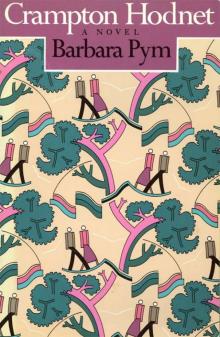 Crampton Hodnet
Crampton Hodnet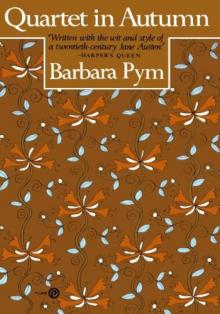 Quartet in Autumn
Quartet in Autumn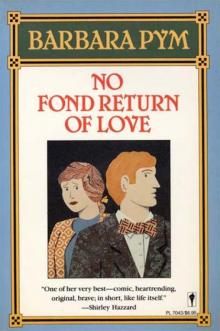 No Fond Return of Love
No Fond Return of Love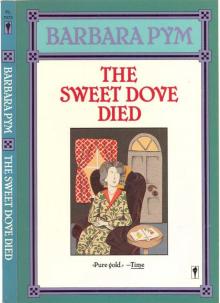 The Sweet Dove Died
The Sweet Dove Died Excellent Women
Excellent Women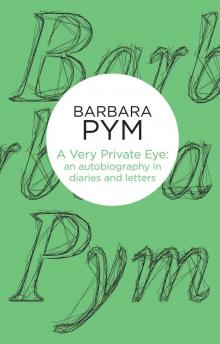 A Very Private Eye: The Diaries, Letters and Notebooks of Barbara Pym
A Very Private Eye: The Diaries, Letters and Notebooks of Barbara Pym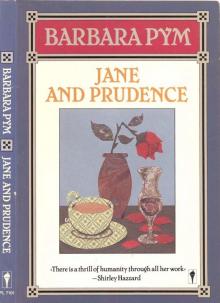 Jane and Prudence
Jane and Prudence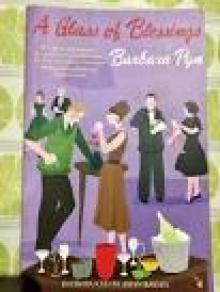 A Glass of Blessings
A Glass of Blessings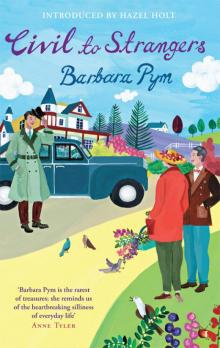 Civil to Strangers and Other Writings
Civil to Strangers and Other Writings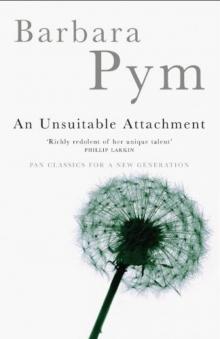 An Unsuitable Attachment
An Unsuitable Attachment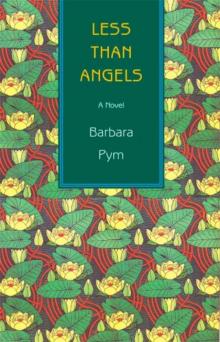 Less Than Angels
Less Than Angels A Few Green Leaves
A Few Green Leaves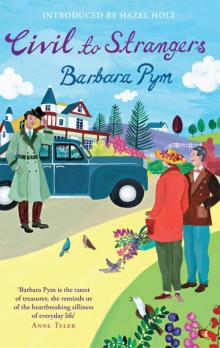 Civil to Strangers
Civil to Strangers